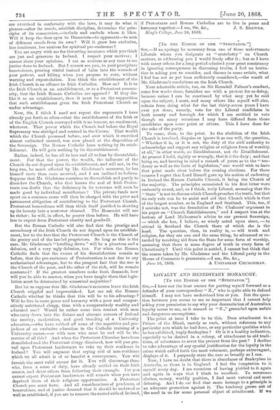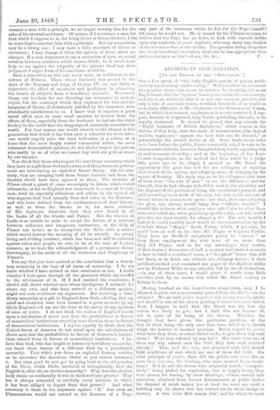LOYALTY AND HEREDITARY MONARCHY.
Fro THE EDITOR OF THE "SPECTATOR."] SIR,—I have not the least excuse for putting myself forward as a defender of your correspondent "Z.," who is quite able to defend himself. I may not have understood him or you. But the ques- tion between you seems to me so important that I cannot help asking your permission to say why your denunciation of Australian loyalty seems to me, as it seemed to "Z.," grounded upon unfair and dangerous assumptions.
The point at issue I take to be this. Does attachment to a Prince of the Blood, merely as such, without reference to any particular acts which he had done, or any particular qualities which he has exhibited, imply flunkeyism ? Or is it a healthy indication, especially to be desired in a colony, of attachment to old tradi- tions, of reluctance to sever the present from the past ? I decline to take advantage of any special justification for the loyalty in the crime which called forth the most vehement, perhaps extravagant, displays of it. I purposely state the case as broadly as I can.
Now, I have no doubt that there is abundance of flankeyism in Australia, as there is in England. I feel the temptation to it myself every day. I am conscious of having yielded to it again and again in ways that I blush to recollect. To reverence clothes, money, worldly position, I find most natural and most debasing. And I do not find that mere homage to a principle is an adequate protection against it. The tendency grows out of the need in us for some personal object of attachment. If we
blame our teachers for not directing our reverence to such an object, but the contempt which they expressed for him and the lampoons of Moore, if abundantly justified by his character, were abundantly mischievous to us. I know that it requires a great moral effort even in some small measure to recover from the effects of them, especially from the tendency to imitate the royal flunkey in the belief that the trappings of monarchy constitute its worth. For that reason one would cherish to the utmost in this generation that which it has been such a calamity for us to miss ; one would eagerly prize the least indication in a colony or at home that the most deeply rooted commercial habits, the most vehement democratical opinions, do not hinder respect for persons who testify to us of what we cannot buy with our gold or create by our theories.
You think that those who respect the hereditary monarchy which they- have as a gift from God and a witness of His permanent govern- ment are introducing an exploded Stuart theory. On the con- trary, they are escaping both from Stuart theories and from the theories which have been opposed to them. The doctrine of Filmer about a grant of some sovereignty to Adam, which vested ultimately, as far as England was concerned, in a race of Scotch- men, must be especially ridiculous and odious in the eyes of all who suppose that God actually lives and rules in the Universe, and who have derived from the continuousness of their history, as well as from the breaks in it, far more evidence of His righteous dominion than they ever found in all the books of all the Clarks and Paleys. But the wisdom of Locke is as unable to make us accept the fiction of a contract between unknown and imaginary contractors, as the folly of Filmier can induce us to interpolate the Bible with a notion which would destroy the meaning of all its records. An actual living and abiding contract, which has been and will be enforced against rulers and people, we own to be at the root of Locke's romance, as we trace the acknowledgment of a permanent divine Sovereignty, in the midst of all the confusion and blasphemy of Filmer's.
You say that you have arrived at the conclusion that a heredi- tary monarchy is the best of all forms of monarchy. I do not know whether I have arrived at that conclusion or not. I doubt whether I have gone through all the processes which are needful to the attainment of it. If I had reached the conclusion, I should still doubt whether men whose intelligence I estimate far above my own, and who have arrived at a different opinion, might not soon overthrow my arguments. But receiving a here- ditary monarchy as a gift to England from God,—feeling that my mind and character have been formed in a great measure by my life in England,—I am not the least at the mercy of any opinions of mine or yours. I do not think the nation of England stands upon a calculation of clever men that the probabilities in favour of monarchical institutions exceed by some fraction those in favour of democratical institutions. I rejoice equally to think that the United States of America do not stand upon the calculations of clever men that the probabilities in favour of democratic institu- tions exceed those in favour of monarchical institutions. I be- lieve that God, who has taught us lessons by hereditary monarchy, can teach them lessons of a different kind by a presidential monarchy. That which you deem an exploded fantasy enables us to reverence the American Order as you cannot reverence it. But what good do you get by going back to the old paradox of Dr. Price, which Burke answered so triumphantly, that the English is, after all, an elective monarchy ? Why does the elective body choose so continually to run in the hereditary groove ? Why has it always concealed so carefully every instance in which it has been obliged to depart from that groove? And what relevancy is there in the argument against "Z." that even an Ultramontane would not extend to the kinsmen of a Pope
connect a man with a principle, we no longer worship him for the sake of his external accidents. Of course, if I reverence a man for that which I suppose he is, for being clever or being virtuous, I do. in some degree associate him with a principle. But my supposition may be a wrong one ; I may have a false standard of virtue or cleverness ; I may change it when the opinion of those about me changes. If a man represents to me a succession of ages, an actual relation between countries which oceans divide, he is much more help to me against the vulgarity of the present than' any mere judgment I might form of his excellence would be.
Such a conviction as this can never make us indifferent to the [To THE EDITOR OF THE " SPECTATOR:I
i the hearts of subjects from a hereditary monarch. NI e cannot Englishman, that the "system" is not quite confined to our country;
any part of the reverence which he felt for the Pope himself ? Of course he would not. He is bound by his Ultramontanism to believe that the Pope has no heirs, to look with especial dislike upon any nephews, or quasi nephews, who may usurp any shadow of the reverence that is due to him. The question being altogether one about hereditary succession, what can be less appropriate than
such an instance as this ?—I am, Sir, &c., F. •



































 Previous page
Previous page